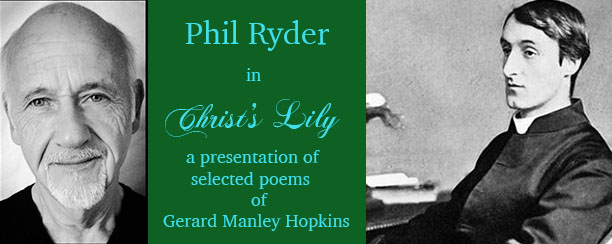Phil Ryder
in
Christ’s Lily
a presentation of selected poetry of Gerard Manley Hopkins
Monday, July 27 at 7:30 PM
1719 25th Street
Host: Tim Kahl
Christ’s Lily is a presentation of selected poetry of Gerard Manley Hopkins (1884 – 1889), the highly innovative Victorian priest-poet. Inspired by Anglo-Saxon and ancient Welsh literature, applying originality and freshness of mind, Hopkins created a uniquely exciting body of work.
Virtually unpublished in his lifetime, Hopkins ‘appeared’ in 1918, nearly thirty years after his death, when his friend Robert Bridges brought out the first edition of his poetry. The poetry was perceived, even in 1918, as ahead of its time, owing to its arresting structure and diction: ‘counter, original, spare, strange’— qualities it retains, some hundred and thirty years after its creation. Exploiting his self-developed technique of ‘sprung rhythm’, his verse expresses an intensity and immediacy not seen before, and seen rarely since, in English poetry.
Infused with religious fervor (Hopkins converted from Anglicanism to Catholicism in 1868, eventually becoming a Jesuit priest), and intoxicated by his love of Nature, the poems are themselves transformational experiences; the outward expressions of the spiritual energy that Hopkins believed, by the grace of God, to be immanent in all Creation. He termed this energy ‘instress’, and called its manifestation in natural objects, ‘inscape’.
Hopkins was insistent that poetry can only be fully understood and appreciated when spoken aloud. This is especially true of Hopkins’s work, which is full of intricate sound-patterns and verbal music.
Included in Christ’s Lily are the famous ‘God’s Grandeur’ and ‘The Windhover: to Christ our Lord’; his two fine poems in praise of Saint Mary: ‘May Magnificat’, and ‘The Blessed Virgin Compared to the Air We Breathe’; and his masterpiece, ‘The Wreck of the Deutschland’, which Phil believes to be the greatest extended English poem of the Victorian era.
God’s Grandeur
The world is charged with the grandeur of God.
It will flame out, like shining from shook foil;
It gathers to a greatness, like the ooze of oil
Crushed. Why do men then now not reck his rod?
Generations have trod, have trod, have trod;
And all is seared with trade; bleared, smeared with toil;
And wears man’s smudge and shares man’s smell: the soil
Is bare now, nor can foot feel, being shod.
And for all this, nature is never spent;
There lives the dearest freshness deep down things;
And though the last lights off the black West went
Oh, morning, at the brown brink eastward, springs–
Because the Holy Ghost over the bent
World broods with warm breast and with ah! bright wings.
Phil Ryder was born in Britain to English and Welsh parents. He currently resides in Folsom, California. He’s a former director and trainer for the renowned British arts organization Inter-Action, and has appeared at London’s Almost Free and National Theatres. Phil’s solo theater projects include ‘Shakespeare in Person’, and ‘Odysseus of Ithaka’. In 1982-83 he worked with the late Sam Wanamaker on ‘This Wooden O’, a play about Shakespeare’s Globe Playhouse, to promote the re-creation of the original Globe in London. ‘This Wooden O’ toured to a variety of venues throughout the United States. Phil has acted a variety of Shakespearean, other classical, and contemporary roles. This fall, he appeared as Grampa, in Sacramento Theatre Company’s production of ‘The Grapes of Wrath’. He’s taught high school in Britain and California, and has had a lifelong interest in the spoken word, and in Romantic and Victorian English literature. Phil’s most recent creations are ‘Songs of God’, a spoken word performance of lyric passages from The Bible, and religious poetry inspired by it (presented at St. Luke’s in 2012); and today’s presentation, ‘Christ’s Lily’.





